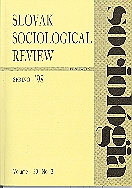Slovensko v období normalizácie a očakávania zmien (1969-1989)
Slovakia in the period of "normalization" and expectation of changes (1969 - 1989)
Author(s): Jozef ŽatkuliakSubject(s): Politics / Political Sciences
Published by: SAV - Slovenská akadémia vied - Sociologický ústav
Keywords: Political development; social development; normalisation
Summary/Abstract: Slovakia in the Period of "Normalization" and Expectation of Changes (1969 - 1989). The papers gives a more systematic perspective on the political and social development of Slovakia in the period 1969 - 1989. The paper consists of the two parts. The first part The politics of normalisation and the society in Slovakia shows the interconnection of the Communist party politics with the development of society. It demonstrates the consequences of the normalisation as emigration and political purges and compares the situation in Slovakia to the one in the Czech Republic. Special attention is given to the indications of the partial awakening of society in 80s (the impact of the Helsinki Conference, the struggle for religious freedoms and for the position of Churches, critical dimension of art, especially theatre etc.) that, however, did not change stagnant character of Slovakian society. On the contrary, the dogmatic communist party wing succeeded to acquire the power in this period and to continue the political persecutions. The second part discusses the constitutional law position and the economic position of Slovakia in the Czechoslovakian federation It is evident that the normalisation politics manifested itself in a full extension in the sphere of constitutional law and economy. Both the deformation of the federal arrangement and the centralisation of economy had seriously affected the situation in Slovakia. The attention is given to the position of Slovakia in the Federation and to the issues of Slovakians social and economic equalising with the Czech lands. The economic data comparison doubts the taken-for-granted statement that the Czech lands "paid for" Slovakia. I also introduce the data about the situation in the power elite in both the countries, the data about military industry and description of the problems of the proposal of new constitution. The paper describes divergent traits of the processes that underwent in Slovakia of that time. In spite of the overall stagnation Slovakia paradoxically showed the economic growth. Shifts apparent in next domains are documented and evaluated briefly. The offered description helps to understand the historical background of the democratisation processes in the Slovak society, the split of the common state of Czechs and Slovaks, the economic problems, problems in culture and in social sphere that have become visible after the November 1989.
Journal: Sociológia - Slovak Sociological Review
- Issue Year: 1998
- Issue No: 3
- Page Range: 251-268
- Page Count: 18
- Language: English

